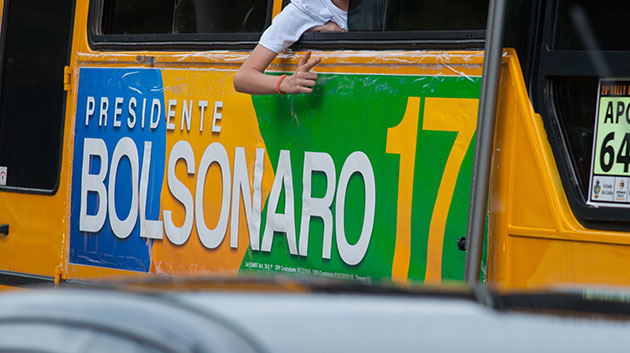“Trump of Brazil” Elected President: Chinese Encirclement May Be a Religious Alliance
Key Points:
- Brazil’s newly elected president dislikes communism and practices Christianity
- The heads of Australia, Malaysia and Philippines separate from China and also value faith
- On a global scale, the world is becoming anti-Chinese and towards “religious alliance”
“Brazil should not lend hands toward socialists, communists, populists nor extreme leftists. We are going to change the destiny of Brazil,” said Jair Bolsonaro, the “Doppelganger of Trump” from the Social Liberal Party.
Brazil’s new president-elect, Bolsonaro, made a bold victory statement to rule the nation under the bible and constitution. In his speech, he stated, “This isn’t coming from a party convention or a personal statement. This is a declaration under God.”
Bolsonaro appealed to leaving the leftist policies established by the previous administration. He called for action to privatize state-owned enterprises and create a smaller government, gaining popularity from the economic circle.
“China isn’t buying from Brazil. They are ‘buying Brazil.’ Are we leaving Brazil in China’s hands?” Bolsonaro raised the problem of public policies dependent on China and called for change.
While not highlighted by the Japanese media, the underlying foundation behind Bolsonaro’s speech are his Christian values.
“Faith is important above all other things. A secular country dividing its government and faith hasn’t existed in history. It’s a ‘no.’ Brazil is a Christian nation. If you don’t agree, you may leave. The minority should follow the majority,” Bolsonaro once stated. We can see that his hope to revive a Catholic nation evoked Brazilians’ pride and led to his victorious election.
Leaders of Australia, the Philippines and Malaysia Value Faith
Similar to Brazil’s new president, the recent global trend has one thing in common: country leaders that value faith.
Recently elected Australian Prime Minister Scott Morrison has shown signs of separation from China. Morrison grew up in a Christian household and met his wife, Jennifer Morrison, at a church.
“I have committed to my faith since my childhood,” Morrison said in his first speech as prime minister. “One’s personal faith towards Jesus Christ shouldn’t be that of a political issue. As former United States President Lincoln would say, our mission is not for God to be with us, but for us to passionately pray that God is with us.”
Malaysian Prime Minister Mahathir Mohamad, who took the position in May, is also against Chinese dependency and is a devout Muslim. However, he doesn’t blindly practice Islamic fundamentalism.
“During the creation process of the great civilization of Islam, a doctrine of faith become rampant and neglected scientific research,” Mohamad said. “Islam isn’t specific to the 7th century. It must be applicable across different eras. Although Islam itself may be true, we must not misinterpret it. It must adapt to the changing times.”
Philippine President Rodrigo Duterte, who took office in 2016, is also one that advocates for distance from China and attacks current Catholicism. However, Duterte takes the stance of a Christian that does not conform to conventional religious views.
“I believe in a supreme god,” Duterte said. “I never once stated that I don’t believe in god. I’m neither an agnostic or an atheist.”
The World Heads Toward “Religious Alliance”
The media is publicizing these countries’ changing policies as anti-Chinese movements. By focusing on their leaders’ philosophies, however, we can infer that the global trend is “communist China versus religious nations.”
This was our statement in the January edition of our print magazine:
” ‘Religion’ is having a much larger influential power on the world than we perceive. A religious understanding becomes essential once we understand the speeches of political leaders and predict international politics past 2018. Will the seeds of dispute grow into a global war? Or will our future be of peace and prosperity? The key is in ‘faith.'”
Countries are facing the Chinese threat and are beginning to assemble under the name of freedom, democracy and faith. We can see the formation of a “religious alliance.” That’s exactly what happened in Brazil.
(Kei Yamamoto)



















